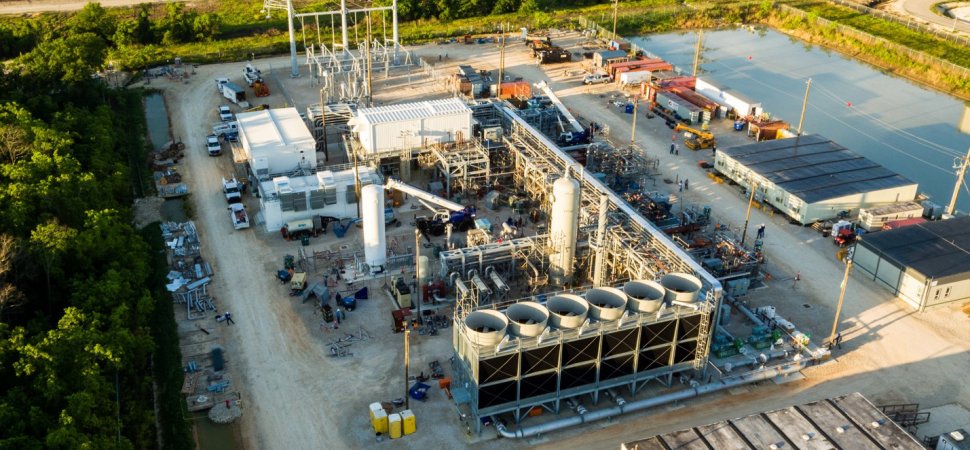In the Texas city of La Porte, the power plant of the future generates enough electricity to power 5,000 homes simultaneously. It burns old-fashioned fossil fuels, yet produces no carbon emissions. Sound impossible?

Credit: NetPower
Net Power, the Durham, North Carolina-based startup behind the plant, is on a mission to prove it’s not only possible but also a potential solution to one of the biggest contributors to climate change. If all goes well, the plant will be the first of many like it around the globe.
Founded in 2008, Net Power has been on a long journey to create a new type of power plant that will appeal to established energy companies. The hope is this first plant serves as the proof of concept necessary to show the industry a path to zero emissions–and, for Net Power, a path to profitability.
For years, the energy industry has experimented with an environmentally friendly process known as carbon capture and storage (CCS). It does exactly what it sounds like: produces energy and sequesters the carbon dioxide byproduct so it can’t escape into the atmosphere. In theory, this would offset the climate-altering effects of burning fossil fuels.
While scientifically plausible, the process usually is prohibitively expensive. First, it requires the construction of extra facilities for capturing carbon. Then, once those facilities are built, they use so much power that they end up offsetting many of the environmental benefits they’re designed to achieve.
British chemical engineer Rodney Allam might have found a way to change that. In the late 2000s, a group led by former Morgan Stanley managing director Bill Brown formed 8Rivers, a venture capital firm that incubates startups working on solutions to large-scale problems. First on the firm’s list: energy.
Soon, an old classmate of Brown’s pointed him in Allam’s direction. The two set up a meeting in London. “Rodney had some ideas,” Brown says. “Pretty quickly, we knew we had our guy.”
Allam developed a new fuel-burning process that entails capturing carbon dioxide at the combustion stage. He joined 8Rivers, which teamed up with two large companies–engineering firm McDermott International and energy company Exelon Generation–that invested a combined $150 million to create and fund Net Power.
The process that makes Net Power so innovative, now dubbed the Allam Cycle, allows much of the carbon dioxide released during combustion to be recycled. The carbon that isn’t reused is captured. It can then be injected underground, where it’s permanently absorbed by rock, or sold to companies that can use it for other purposes like manufacturing plastics or extracting oil. The net result is an emissions-free process that can generate electricity on a large scale.
The Texas plant, which first fired up in May, can produce 25 megawatts, enough to power all the homes in a medium-size town simultaneously. It isn’t yet sending electricity to the local grid; Brown hopes that will happen within the next several months, once the plant completes an extensive series of tests and gets connected with Texas utility company Ercot.
Meanwhile, the company is looking to partner with an energy company on its first full-size plant, which will be capable of producing 12 times as much energy. Net Power’s goal is to complete that project by 2022.
The Texas plant cost $150 million to build, and Brown says the price of running it will be on par with that of a conventional power plant–clearly, a critical factor for wide adoption. The goal is to go even further.
“We’ve got to make it cheaper than polluting systems,” Brown says. “Here in the U.S., we tend to think that if we can afford it, then the system works. But that’s not good enough. We’ve got to make it so cheap that China and India will choose it, and developing nations will be able to afford it.”
It’s an ambitious goal, but a worthwhile one. Electricity generation is the cause of about 40 percent of the world’s annual greenhouse gas emissions. The world’s total emissions rose in 2018, even as scientists point to the dire need to reverse the trend immediately.
Net Power isn’t the only company trying to change the way the world generates energy. Arizona-based Depcom builds solar energy power plants. Last year, five years after its founding, it reached No. 5 on the Inc. 5000 list of the fastest-growing private companies in the country. Wind farms are also on the rise: Wind provided nearly 7 percent of the U.S.’s total energy supply in 2018, up from 1 percent a decade earlier.
While Net Power’s plants produce no emissions, critics may point to the fact that it still burns natural gas. “The future needs to feature dramatically less reliance on fossil fuels,” says James Mulligan, associate at the World Resources Institute, who leads projects on climate change.
Still, conversion to renewable sources can be difficult and costly, which is why Mulligan says a solution like Net Power’s is a practical path forward. “Taking that option off the table because we’d rather kill than reform the fossil fuel industry would be foolish.”
“Everyone,” he says, “should be praying they succeed.”
By Kevin J. Ryan published on Inc




